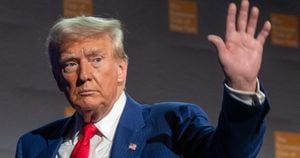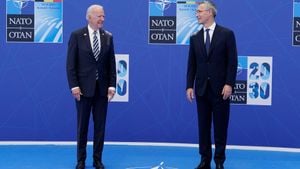The world of artificial intelligence (AI) is on the brink of significant changes following Donald Trump’s recent election victory. Experts are pondering how his administration will reshape the current AI policies, especially considering Trump's campaign promises to reverse the executive order concerning AI issued by President Joe Biden. This executive order was part of Biden's broader agenda to govern the development and deployment of AI technologies, which critics have labeled as overly restrictive and stifling to innovation.
AI policy experts suggest the Trump administration will adopt a more lenient approach, reminiscent of their earlier time in power. According to Adam Thierer, a senior fellow at the R Street Institute, Trump's team is likely to steer federal agencies toward less stringent regulations, concentrating on alternatives to direct oversight. This leaner regulatory framework aims to stimulate innovation and technological development without imposing many restrictions — contrasting sharply with Biden's more structured and often criticized directives.
Since Biden's executive order (EO 14110) was rolled out last year, it laid down comprehensive strategies, including internal governance structures and national security assessments related to AI usage. The order was touted as one of the most extensive government actions taken globally to address AI's rise. It mandated various security information-sharing protocols but has also faced backlash from Republican factions who deem it burdensome for businesses.
With many uncertainties about the specific details of Trump's new AI policy, analysts believe the administration's emphasis will be on national security and enhancing the competitive edge of the United States over rivals, namely China. The incoming administration could very well focus on deregulating AI and fostering innovation, leading to concerns from some quarters about the potential creation of what experts call an 'AI arms race.'
Critics have pointed out the worries associated with this deregulatory push. The potential for unregulated AI technologies could lead to various social risks, including large-scale job automation and increased social manipulation resulting from algorithm-driven content. For example, there is apprehension about AI's capability to fill online user feeds with misleading content substantially swaying public opinion.
Some experts, like Caroline Carruthers, draw parallels between the anticipated AI race and the historic Manhattan Project, which developed the atomic bomb. Carruthers argues Trump's approach may prompt the country to accelerate its push for AI supremacy, promoting not just the technology's development but also its application within defense strategies.
For the United Kingdom and other nations, Trump's presidency signals notable shifts in AI governance. Piers Linney, a former investor on BBC's Dragons' Den, argues the deregulatory environment could compel nations to bolster domestic AI capacities or align more closely with the standards set by the US tech giants.
One significant focus heading forward is how the Trump administration will address technologies deemed sensitive or risky to national security. Concerns have swirled around issues of countering AI bias and upholding civil rights throughout Biden's tenure, mandatorily assessing algorithmic discrimination. With the GOP's more skeptical stance toward these measures, analysts believe safeguards protecting civil rights may not be prioritized under Trump.
While some elements of Biden's strategy received bipartisan support, Trump may not only erase parts of it but also realign the national focus on innovation, potentially neglecting concerns raised about civil rights violations. This deregulatory trend raises eyebrows among analysts aiming to balance technological advancement with ensuring the ethical deployment of AI.
Interestingly, the impact of Trump's friendship with tech mogul Elon Musk can't be overlooked. With Musk's influence over AI strategies and his connections to cutting-edge technology companies, it remains to be seen how this relationship might shape the Trump administration's AI pathways.
Another point to keep watching is the fate of initiatives like the AI Safety Institute and the National AI Research Resource pilot. Though conceived under the Biden administration, if Trump's approach does not give these plans necessary support, they could stagnate or lose the momentum required to flourish. Their success hinges on Congress's readiness to form bipartisan legislation supporting these initiatives, which helps bolster the AI infrastructure.
Experts predict favoring strong AI exports could also provide the US with leverage over China, setting the stage for who leads the charge on AI technologies globally. This strategy contrasts with imposing tariffs and restrictions, which could hinder the development of domestic tech ventures due to higher operational costs.
Although the winds of policy change bring opportunities for innovation, they also come with risks. The potential neglect of privacy alongside unregulated AI development could lead to scenarios where private information gets exploited without consumers' knowledge. This, coupled with the deregulatory promises, raises ethical questions about how far the relationship between tech development and public welfare will stretch.
These upcoming adjustments could reshuffle the deck for AI businesses and start-ups. With new dynamics at play, the balance will hinge on how swiftly stakeholders adapt to the changes and whether they can advocate for responsible applications within the rapidly advancing tech environment.
One thing is for certain: as the dust settles on the election, the ramifications of Trump's AI policy shift will soon shape not just US positions, but influence global technology landscapes. With the world watching closely, the incoming administration will have to tread carefully through the maze of innovation, regulation, and ethical responsibilities to navigate what is undoubtedly one of the most consequential technological discussions of our time.



